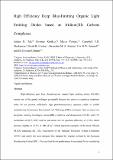High-efficiency deep-blue-emitting organic light-emitting diodes based on iridium(III) carbene complexes
View/
Date
13/12/2018Author
Grant ID
EP/P010482/1
EP/M02105X/1
ECF-2017-326
EP/P010482/1
Keywords
Metadata
Show full item recordAbstract
High‐efficiency pure blue phosphorescent organic light‐emitting diodes (OLEDs) remain one of the grand challenges, principally because the emissive complexes employed either do not possess sufficiently high photoluminescence quantum yields or exhibit unsatisfactory Commission International de l'Éclairage (CIE) coordinates. Here two deep‐blue‐emitting homoleptic iridium(III) complexes are reported and OLEDs are demonstrated with CIE coordinates of (0.15, 0.05) and maximum external quantum efficiency of 13.4%, which decreases slightly to 12.5% at 100 cd m−2. They represent examples of the most efficient OLEDs surpassing the CIEy requirement of the National Television System Committee (NTSC) and the European Broadcasting Union (EBU). Emitter orientation contributes to the excellent device performance.
Citation
Pal , A K , Krotkus , S , Fontani , M , Mackenzie , C F R , Cordes , D B , Slawin , A M Z , Samuel , I D W & Zysman-Colman , E 2018 , ' High-efficiency deep-blue-emitting organic light-emitting diodes based on iridium(III) carbene complexes ' , Advanced Materials , vol. 30 , no. 50 , 1804231 , pp. 1-10 . https://doi.org/10.1002/adma.201804231
Publication
Advanced Materials
Status
Peer reviewed
ISSN
0935-9648Type
Journal article
Description
The authors are grateful to the University of St Andrews and EPSRC financial support (grants EP/P010482/1 and EP/M02105X/1). A.K.P thanks the Leverhulme Trust Early Career Fellowship (ECF-2017-326). I.D.W.S. acknowledges a Royal Society Wolfson Research Merit award.Collections
Items in the St Andrews Research Repository are protected by copyright, with all rights reserved, unless otherwise indicated.

